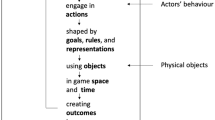Abstract
Semivalues are shown to exhibit a capability of modification that enables us to introduce additional information in the evaluation of games. After using a general method to design modified versions of the Shapley and Banzhaf values, we apply them to some political, economic and sociological problems.
Similar content being viewed by others
References
J.F. Banzhaf, Weighted voting doesn't work: A mathematical analysis, Rutgers Law Review 19 (1965) 317-343.
E. Calvo and J.C. Santos, Potentials in cooperative TU games, Mathematical Social Sciences 34 (1997) 175-190.
F. Carreras and J. Freixas, Some theoretical reasons for using (regular) semivalues, in: Logic, Game Theory and Social Choice, ed. H. de Swart (Tilburg University Press, 1999) pp. 140-154.
F. Carreras and J. Freixas, On power distribution in shareholder corporations, Journal of Public Economic Theory (2000), forthcoming.
J.S. Coleman, Control of collectivities and the power of a collectivity to act, in: Social Choice, ed. B. Lieberman (Gordon and Breach, 1971) pp. 269-300.
I. Dragan, New mathematical properties of the Banzhaf value, European Journal of Operations Research 95 (1996) 451-463.
I. Dragan, Potential and consistency for semivalues of finite cooperative TU games, International Journal of Mathematics, Game Theory and Algebra 9 (1999) 85-97.
P. Dubey and L.S. Shapley, Mathematical properties of the Banzhaf power index, Mathematics of Operations Research 4 (1979) 99-131.
P. Dubey, A. Neyman and R.J. Weber, Value theory without efficiency, Mathematics of Operations Research 6 (1981) 122-128.
E. Einy, Semivalues of simple games, Mathematics of Operations Research 12 (1987) 185-192.
V. Feltkamp, Alternative axiomatic characterizations of the Shapley and Banzhaf values, International Journal of Game Theory 24 (1995) 179-186.
A.B. Khmelnitskaya, Power indices without the transfer axiom, in: Logic, Game Theory and Social Choice, ed. H. de Swart (Tilburg University Press, 1999) pp. 208-213.
A. Laruelle and F. Valenciano, Shapley-Shubik and Banzhaf indices revisited, Mathematics of Operations Research 26 (2001) 89-104.
E. Lehrer, An axiomatization of the Banzhaf value, International Journal of Game Theory 17 (1988) 89-99.
B. O'Neill, A problem of rights arbitration from the Talmud, Mathematical Social Sciences 2 (1982) 345-371.
G. Owen, Multilinear extensions and the Banzhaf value, Naval Research Logistics Quarterly 22 (1975) 741-750.
G. Owen, Characterization of the Banzhaf-Coleman index, SIAM Journal of Applied Mathematics 35 (1978) 315-327.
L.S. Shapley, A value for n-person games, in: Contributions to the Theory of Games II, eds. H.W. Kuhn and A.W. Tucker (Princeton University Press, 1953) pp. 307-317.
L.S. Shapley and M. Shubik, A method for evaluating the distribution of power in a committee system, American Political Science Review 48 (1954) 787-792.
P.D. Straffin, The Shapley-Shubik and Banzhaf power indices, in: The Shapley Value, ed. A.E. Roth (Cambridge University Press, 1988) pp. 71-81.
R.J. Weber, Subjectivity in the valuation of games, in: Game Theory and Related Topics, eds. O. Moeschlin and D. Pallaschke (North-Holland, 1979) pp. 129-136.
R.J. Weber, Probabilistic values for games, in: The Shapley Value, ed. A.E. Roth (Cambridge University Press, 1988) pp. 101-119.
H.P. Young, Monotonic solutions of cooperative games, International Journal of Game Theory 14 (1985) 65-72.
Author information
Authors and Affiliations
Rights and permissions
About this article
Cite this article
Carreras, F., Freixas, J. Semivalue Versatility and Applications. Annals of Operations Research 109, 343–358 (2002). https://doi.org/10.1023/A:1016320723186
Issue Date:
DOI: https://doi.org/10.1023/A:1016320723186




